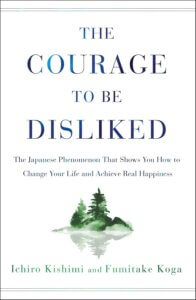As someone in recovery from the “disease to please,” I was drawn to the title of the book The Courage to Be Disliked, by Japanese authors Ichiro Kishimi and Fumitake Koga. Based on the theories of psychologist Alfred Adler, it illuminates key principles for living a life of true freedom and authenticity. The authors also have since published a follow-up book titled The Courage to Be Happy.
While I found the literary mechanism of a dialogue between a youth and a philosopher a bit clunky at times, overall, the book does a great job of teaching important psychological concepts to the layperson. In my opinion, the perspective on trauma offered is for later stages of trauma recovery, once the person has had their pain witnessed and meaning identified. However, it is a helpful reminder to us all about returning to the here and now.
A few key ideas:
- We don’t live in an objective world, but instead a subjective one we give meaning to. We have the power to choose our response. Even dysfunctional behavior has a goal; make the goal more conscious to increase functional behavior.
- The past does not define us, only the meaning we give to it matters. “The important thing is not what one is born with [or what happens to us] but what use one makes of that equipment [experience].”
- Many psychological theories are etiological – based on cause and effect, which they propose is not real. Rather, the Adlerian perspective is teleological in that it seeks to determine meaning, purpose and goals in symptoms and behavior.
- All problems are interpersonal relationship problems. “Loneliness isn’t being alone; it’s feeling excluded.”
- Self-acceptance, not self-affirmation, is a key goal for happiness.
- The pursuit of superiority is the desire to escape from feelings of helplessness.
- Feelings of inferiority are subjective and based on comparisons.
- Liberate oneself from the desire to be special; find the courage to be normal.
- There are 2 objectives for behavior
- Self-reliance – “I have the ability.” A sense of belonging and true self-worth come from making a contribution.
- Harmony – “People are my comrades.” (Use of the term comrades is an example of the sometimes awkward interpretation from Japanese to English.) Building confidence in others, instead of trust, is essential to harmony.
- Boundaries are clarified by understanding life tasks of work, friendship, and love.
- Seeking recognition, praise or rebuke moves us into vertical, not horizontal, relationships and diminishes our power. Equal relationships are based on gratitude and encouragement.
- All power is in the here and now.
In summary, the book explores concepts such as our power to choose our response, healthy boundaries, the importance of self-acceptance, and the pursuit of harmony in relationships. It serves as a valuable guide for those seeking to overcome the “disease to please” and embrace a more fulfilling and authentic life.
– Yvonne Campbell, Founder











